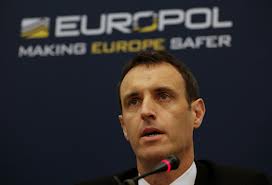July 29 – Europol is spreading its football wings and has announced today it is to conduct an investigation into alleged football match fixing by the Russian mafia. The investigation will also look at organised crime groups in the Balkans. Rob Wainwright, the head of the EU police intelligence agency, told the Sunday Times said that in addition to the 380 matches that have been investigated since February, a further 300 were now considered suspicious.
Insideworldfootball columnist Richard van Poortvliet wrote about the latest suspicions of matchfixing in his column Match-fixing? Who cares? on this website (http://www.insideworldfootball.com/richard-van-poortvliet/12469-richard-van-poortvleit-match-fixing-who-cares).
Europol reported earlier this year that their investigators were looking into 680 football games around the world, 380 of them in Europe, including World Cup and European Cup games, two Champions League games and various European cups games.
“This problem isn’t one just linked to Asian organized crime. We also have our suspicions about Russian mafia groups involved in match fixing. We are looking at that for the moment. Also we are looking at some organized crime groups originating from the western Balkans,” said Wainwright.
“I am not surprised by this. For the gangs, this is high profit and low risk in nature. We know that Russian groups are active across many sectors so we are not surprised they are having a go at this one as well. We are boosting our team here [in the Hague] to investigate this,” he said.
A new law aimed at getting rid of match fixing was signed at the start of the year by Vladimir Putin, which could see offenders handed a seven year jail term and/or a fine of $32,000. In theory this is a step forward, but in reality could it ever work? The answer to this question is yes and no. When looking at the Russian Premier League, the answer is probably no, as the vast majority of club owners have connections going right to the very top (see van Poortvliet’s column)
Recently, 44 suspects were charged in Hungary after an inquiry into spot fixing involving Debrecen. Spot fixing is where the punter predicts an event or an element of the (for example, the time of the first corner or the number of corners in the first half) rather than the result of a match. Spot fixing has been prevalent in cricket in recent years resulting in a number of court cases and imprisonment of players.
Previously, money from spot fixing has been traced back to betting syndicates in Singapore, but Wainwright believes European crime gangs are also involved.
Contact the writer of this story at moc.l1745576521labto1745576521ofdlr1745576521owedi1745576521sni@n1745576521osloh1745576521cin.l1745576521uap1745576521

